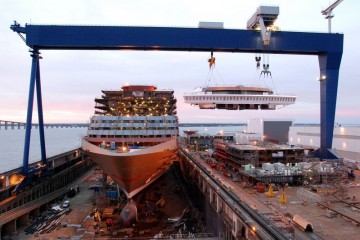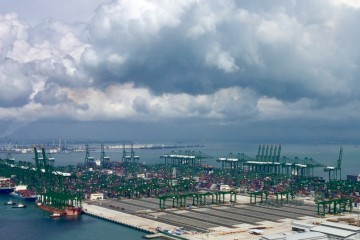The demise of London as global maritime capital has often been announced, but has never actually really happened. This time things might be different: by voting to leave the European Union the Brits might have started single-handedly the dismantling of their maritime cluster. When looking at successful maritime clusters, we notice three essential traits: they act as gateways, are closely related to a wider financial and services sector, and typically linked to a substantial port or shipping sector. Brexit undermines all three traits.
No longer gateway to Europe
Global maritime clusters often function as gateway for service provision to whole continents. Maritime services providers locate in Singapore to access Asia, in Hong Kong to service the Chinese market. How could London possibly continue to be perceived as a gateway to Europe if it no longer wants to be European and leaves the European internal market? Logistics functions for the whole European market will shift from London to other places in Europe, and a similar shift could be expected for the maritime services sector: ship finance, maritime law, consultancy, engineering, ship classification and all kinds of other related services. There is a chance that the UK would negotiate to be part of the single market, despite being outside the EU, but this negotiation would take time – at least two years – and its outcome is far from certain.
Exit the financial sector
London’s status as a global maritime capital is to a large extent related to its strong financial services sector. Shipping is a capital intensive sector, so it needs specialised financial services. Moreover, a strong financial sector brings with it a range of other professional services that are of use to shipping, such as lawyers, consultants and high-class restaurants. Over the last days, there have been alarming reports: London’s financial institutes would lose their European “passporting rights”, so longer be able to operate by EU rules, and relocation of financial services from London to other European capitals would already have started. If this trend confirms itself, many of the high value added maritime service providers in London could follow soon.
Decline of UK flag
Maritime clusters are often located in important shipping nations, as they provide services to the shipping industry. The United Kingdom is an island nation, highly dependent on maritime transport, with 40% of its imports coming from the EU. Shipping within the EU has been hugely facilitated by EU cabotage regulation, which allows coastal shipping in EU waters to EU flagged vessels. With the UK intention to leave, it is unclear if UK-flagged vessels will in the future still be able to conduct coastal shipping in EU waters. UK might want to ensure this in the negotiations but – again – this takes time and it is not sure they will get it. So, there is a real and substantial risk that British shipowners will flag out and choose instead one of the other EU flags. The result would be a decline of the UK-flagged fleet, which could have an adverse effect on London as a maritime services cluster.
Add this all up and the concluding outcome is rather chilling. With one vote, UK citizens might have made London a less attractive place for maritime services. Places like Hamburg, Copenhagen and Amsterdam-Rotterdam could benefit.
4 Comments
Comments are closed.




Copenhagen the ideal location
You are well behind the times Olaf, most British ship-owners flagged out years ago!
Or a golden opportunity for the UK! Better terms for the flag might help attract more ships and we can have real free zones and become a european hub for trade and use rail and road to transport goods into Europe.
Typical article. Shipping is the servant of Trade – as trade patterns change so will shipping. It will all happen gradually. The service sector will find a way it always does and just wait for the new technology.
City: Marine Insurance 12% with Europe and 88% with the rest of the world. Frieght = $ not Euro
Flag: UK v Red Ensign Bermuda, Cayman Islands, Gibraltar, Isle of Man and British Virgin Islands.
Shipping companies and financial institutions have gone offshore to avoid Europe.
Incidentally, Airbus 0R Dream Liner what is your view?
Maritime Comentator